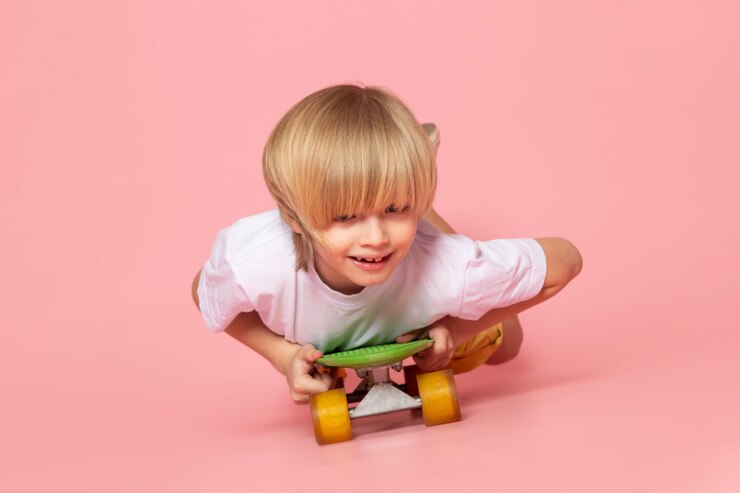Introduction : Toddler Development
Play is an integral part of a toddler’s development, providing opportunities for growth in multiple areas, including cognitive, social, emotional, and physical skills. Toddlers use play to explore the world, learn new skills, and interact with others. In this blog, we’ll explore how different types of play can foster toddler development and suggest creative activities that enhance their learning through play.
1. Understanding the Importance of Play in Toddler Development
Toddlers (ages 1-3) are at a stage of rapid growth, and play is their primary mode of learning. Play allows them to experiment with their surroundings, practice problem-solving, and develop essential life skills. Research shows that toddlers who engage in a variety of play activities demonstrate better cognitive, social, and emotional outcomes than those with limited play opportunities.
- Cognitive Development: Play helps toddlers improve their thinking skills. Through games and activities, toddlers learn to categorize, identify patterns, and solve problems.
- Emotional Development: Play helps toddlers express their emotions and understand how others feel. Pretend play, in particular, encourages toddlers to explore different emotions and empathize with others.
- Social Development: Group play fosters social skills such as sharing, cooperation, and communication. Toddlers who play with peers learn important social cues and build friendships.
- Physical Development: Active play develops both gross and fine motor skills. Toddlers enhance their balance, coordination, and strength through physical activities like running, climbing, and jumping.
2. Cognitive Development Through Problem-Solving Play
Problem-solving play helps toddlers develop critical thinking and reasoning skills. Activities that challenge their minds encourage cognitive growth.
- Puzzle Play: Introduce age-appropriate puzzles to your toddler. Start with simple two- or three-piece puzzles and gradually increase the complexity as they get older. Puzzles teach toddlers about spatial relationships, colors, and shapes while enhancing problem-solving abilities.
- Sorting Games: Give your toddler items to sort by color, size, or shape. Sorting helps develop their ability to categorize objects and understand differences and similarities.
- Building Blocks: Provide building blocks or stacking toys to encourage creativity and logical thinking. Ask your toddler to build towers, bridges, or structures. This promotes spatial awareness and problem-solving.
3. Emotional Development Through Pretend Play
Pretend play is a powerful tool for helping toddlers understand their emotions and the emotions of others. By engaging in role-playing, they can safely explore feelings and develop empathy.
- Dress-Up Play: Provide costumes or everyday items that your toddler can use to dress up as different characters (e.g., doctors, chefs, or superheroes). Encourage them to act out scenarios and solve problems as their chosen character. This builds emotional intelligence as they learn to navigate different social roles.
- Pretend Kitchen: Set up a pretend kitchen with toy food, utensils, and cookware. Allow your toddler to “cook” meals and serve them to family members. This helps them learn about routines and cooperation while exploring different emotions in a playful setting.
- Puppet Shows: Use puppets to act out simple stories that reflect everyday emotions, such as happiness, sadness, or anger. Allow your toddler to control one of the puppets and contribute to the story. This fosters an understanding of emotions and appropriate ways to express them.
4. Social Development Through Group Play
Playing with others teaches toddlers valuable social skills, including communication, teamwork, and empathy. Group activities encourage toddlers to engage with peers, share, and cooperate.
- Playdates: Arrange regular playdates with other toddlers to promote social interaction. Activities like building sandcastles or playing house encourage collaboration and sharing. Toddlers learn how to take turns and respect others’ space during group play.
- Group Art Projects: Organize group art sessions where toddlers can work together on a shared canvas or craft. This promotes teamwork and teaches them how to communicate and compromise.
- Follow-the-Leader: Play follow-the-leader with a group of toddlers. One child leads the others in a series of movements (e.g., hopping, clapping, or spinning), and the others follow. This game encourages cooperation and social bonding while developing physical coordination.
5. Physical Development Through Active Play
Active play is essential for developing gross motor skills, balance, and coordination. Toddlers who engage in physical play are more likely to develop strong muscles, improve their physical health, and build confidence in their abilities.
- Outdoor Adventures: Take your toddler on outdoor adventures such as walks, hikes, or trips to the park. Encourage them to run, jump, and climb to build their physical strength. Nature also provides endless opportunities for exploration, enhancing both physical and cognitive development.
- Dancing and Music Play: Play music and encourage your toddler to dance. Dance helps develop coordination, balance, and rhythm. Introduce different styles of music to expose them to various movements and tempos, making the activity both fun and educational.
- Obstacle Courses: Set up a simple obstacle course at home using pillows, boxes, or chairs. Encourage your toddler to crawl under, jump over, or walk around obstacles. This helps them develop their gross motor skills while keeping them physically active.
6. Creative Play to Foster All-Around Development
Creative play, such as drawing, painting, and crafting, allows toddlers to express themselves while building their cognitive, social, emotional, and physical skills.
- Art and Craft Time: Provide your toddler with paper, crayons, paints, and other craft materials. Let them create whatever they want. Art fosters creativity, fine motor skills, and emotional expression. Additionally, discussing their artwork helps develop language skills and imagination.
- Music Exploration: Introduce simple musical instruments, such as tambourines, drums, or xylophones. Allow your toddler to explore sounds and create their own music. This encourages creativity, rhythm, and auditory development.
- Storytelling Play: Encourage your toddler to create their own stories using toys or dolls as characters. This promotes language development, imagination, and problem-solving skills.
Conclusion
Play is more than just fun for toddlers – it’s a vital part of their development. By providing a variety of play opportunities, parents can support cognitive, emotional, social, and physical growth. Whether it’s solving puzzles, engaging in pretend play, or exploring the outdoors, each play activity contributes to a toddler’s overall development. Embrace playtime as a learning opportunity and watch as your toddler grows and thrives.


2 thoughts on “The Role of Play in Toddler Development: How to Foster Growth Through Fun Activities”